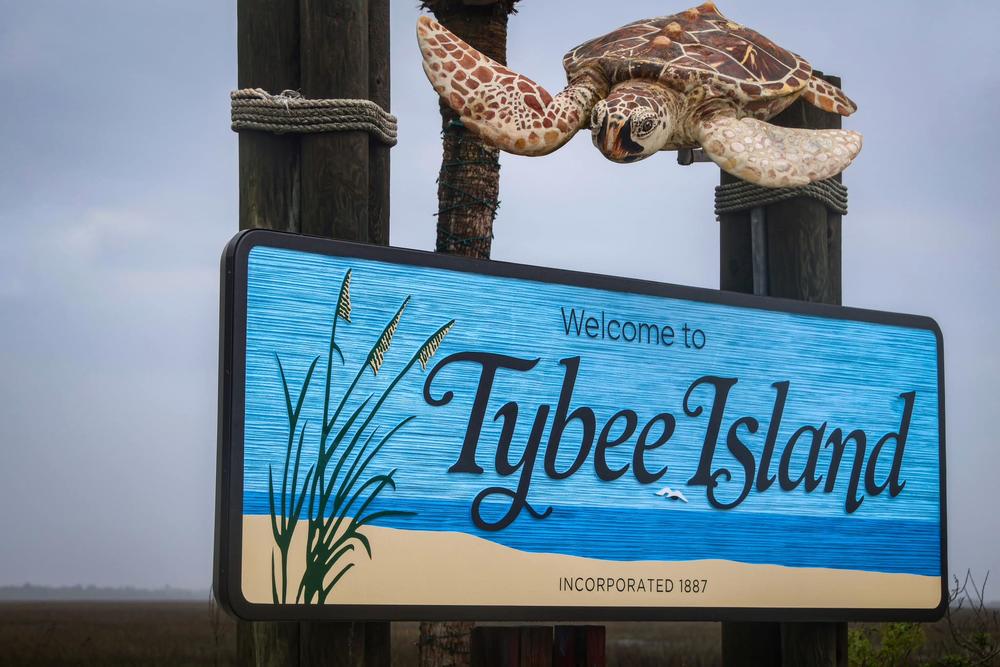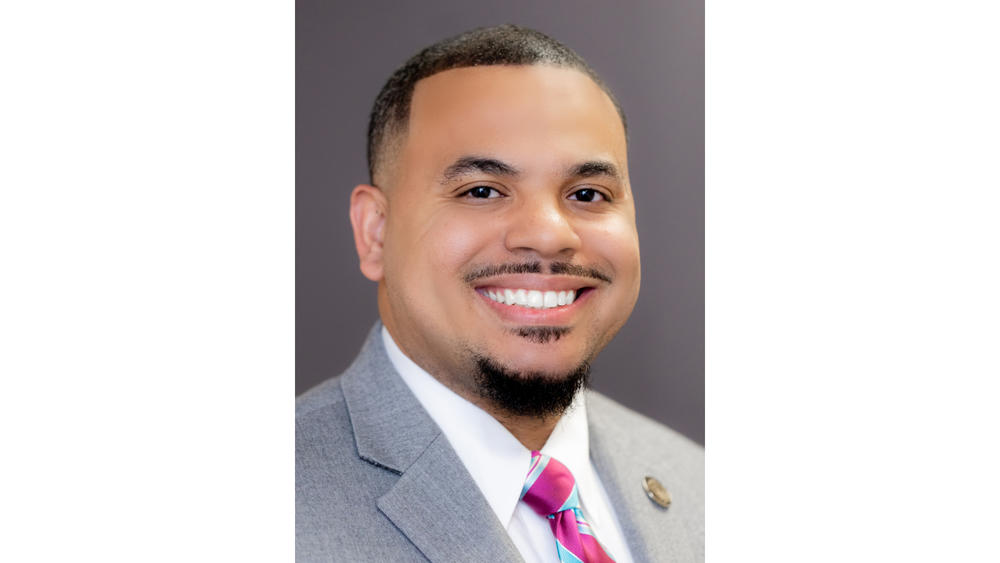
Section Branding
Header Content
‘This bill is not designed to stop Orange Crush’: Lawmaker shares outlook on Tybee Island gathering
Primary Content
LISTEN: Georgia Sen. Derek Mallow (D-Savannah) co-sponsored a newly enacted state law on unpermitted events. GPB's Benjamin Payne reports.

Despite concerns expressed by some on Georgia's Tybee Island, a state lawmaker in nearby Savannah is cautiously optimistic ahead of this weekend's Orange Crush spring break festival, which last year drew estimated crowds of more than 100,000 people to the roughly 3-mile-long island.

Democratic State Sen. Derek Mallow of Savannah is applauding Senate Bill 443, which he co-sponsored and which Republican Gov. Brian Kemp signed into law this month. It empowers local governments such as Tybee Island to seek financial damages from organizers and promoters of unpermitted events, such as the cost of public safety that permitted events typically help pay for.
GPB Savannah reporter Benjamin Payne spoke with Mallow about the new law and about his outlook for Orange Crush, as both a lawmaker in the legislature and as an alumnus of Savannah State University, the historically Black school whose students popularized the festival among young Black adults beginning in 1988.
Benjamin Payne: SB 443's text doesn't explicitly mention Orange Crush by name, but I understand that last year's gathering on Tybee Island was the impetus behind it. What do you hope the new law accomplishes this year, as it pertains to Orange Crush?
Derek Mallow: My hope is that those who seek to charge tickets for unpermitted events will now understand that there's legal recourse for the city.
If you as a festival-goer pay for a ticket, you have the reasonable expectation that you will be provided public facilities and public safety. If you go to a concert at a concert hall, you want to know that there's restrooms, there's running water, there's security inside of the building. You would like to be protected.
That falls to the city of Tybee Island when individuals charge that ticket price and then say, "Oh, well, the city knew we were coming." No, the city didn't have a permit for this event. They didn't know what the scale of the event was. So, I think with promoters and those who seek to just take money from folks and make a profit — off of something that was a free event for a very long time — those are the folks that I want to see held accountable. Now, for those coming out to the beach, I want folks to have a good time.
Benjamin Payne: What have you heard from constituents in Savannah and outside your district elsewhere in Chatham County about their feelings ahead of this year's Orange Crush, given last year's record turnout?
Derek Mallow: I've heard from numerous people. There are those who remember when Tybee Island was a segregated beach. Those who understand that Tybee Island was a quarantine station for slaves coming in to the port of Savannah. And so, with the presence of things happening on Tybee Island, there's that concern of "Are we going backwards?"
And then there are folks concerned about the public welfare of those who are coming onto the beach, and who have asked me to engage in conversation with city leadership. Last year, Tybee was grossly overwhelmed. They can't handle 100,000 people. They don't have the infrastructure to do that. And so now as we talk through that and explain that to constituents, and they get a chance to understand what actually took place, it's a much better conversation, I think, moving forward.
Benjamin Payne: How do you reconcile those two perspectives?
Derek Mallow: I think you have to strike a balance. The city should move in a posture that says, "You know what? We know this event has been happening for a long time. We're just going to embrace it." I think anytime you meet something with resistance there, those are going to prove a point, right? And to figure out what the underlying intent is.
I would attend Orange Crush when I was a young college student at Savannah State University. The issue with Orange Crush has been going on since I can remember, over the last several mayors. And the fact is that you just can't stop it. Because if you try to erase it, the presumption of the history of the island suggests what you're trying to do is predicated on the past. What Tybee Island has to do is to welcome the event and put guardrails up, and say, "Hey, we know this is going to happen. We're going to welcome you, and here's what we're going to do, to support the event like we would any other event on the island." And I think that's what they're going to have to do.
Benjamin Payne: You mentioned that you attended Orange Crush when you were a student at Savannah State University. When did you go, and what was it like back then?
Derek Mallow: I attended Orange Crush probably in 2006, 2007, 2008 and 2009. I most certainly remember the 2008 Orange Crush because I went out there with my cousin who rode motorcycles, and we had a great time at the beach, watching those that were in Divine Nine organizations strolling. You had step performances out there, people just walking the beach, people in the water, people playing volleyball and football. And then it was like a car show, where people came out with their old-school cars, the Box Chevys. It was an event that was really cultural.
Like any event, you're going to have somebody come out there and ruin it for everybody. But most of the folks who attend are law-abiding and will do the right thing. You've got the bad actors, but you've got bad actors everywhere.
When it comes to public safety, and you talk about the number of guns out there, well, Gov. Kemp signed a bill in 2022 that says you don't need a concealed carry permit for handguns. So, we have to live with the policy actions of this current administration that have put us in the posture where you can't say, "No guns on the beach." So, unfortunately, we've got to live with this decision from the Kemp administration.
Benjamin Payne: Speaking of politics, what's interesting to me about the unpermitted events bill is that it passed overwhelmingly in both chambers of the legislature with strong bipartisan support. Can you speak to how SB 443 made its way through the legislature?
Derek Mallow: I'll give credit to my conversations with Senate Minority Leader Gloria Butler. I talked with Leader Butler and State Sen. Nikki Merritt and others that had concerns about the bill, who said, "Sen. Mallow, you need to explain this to us. We want to know more before we vote on this. We have reservations."
I said, "Listen, this bill is not designed to stop Orange Crush." I said this bill is designed to stop the people who knowingly charge people a price to come to a public beach, and they shouldn't. And so, if you're going to take folks' money, and the city and taxpayers of Tybee are going to have to be on the line for your event, and you're going to make all the money and not have to pay for the public safety of some of the other things that any good promoter would have to do in any other city, then the city should be able to go back and recoup some of those damages from you.
This bill in no way prohibits Orange Cross from happening. It doesn't. It just gives the city and any city a toolbox for people that want to subvert the process, charge ticket prices for events, and then overwhelm a city who may not be prepared for an event.
Benjamin Payne: Is there anything else you'd like to mention that I didn't ask about?
Derek Mallow: I plan to be on Tybee Island this weekend. I want to go and see it for myself. I'm going to go because my constituents are very concerned about it. I want to see how African American college students are going to be treated. I do have concerns, and I've shared those with city leadership.
I asked, "Why are you closing parking?" I didn't know this: [Tybee Island Police Chief Tiffany Hayes] went to Miami Beach to observe how they were handling spring break. Spring break used to only be college students. Now, you have other people mixing in with those college students. And I do understand that you have to keep those college students safe — especially those young women, because there are those people that seek to do harm, and there are those people that seek to come out and traffic women.
I think what the city is trying to accomplish with some of their measures may be to reduce some of that, and to be able to control the crowd, because if something were to happen, they can't quite get emergency vehicles onto the beach if everything is blocked up and congested. And so in my conversations with city leadership, this is about what happens if we're overwhelmed. How do we respond and how do we get people to safety? We need a clear pathway to do that. And they're expecting 100,000 people this year. So, I'm concerned about how they handle 100,000 people. Tybee Island is not built to handle 100,000 people. But I do think there are other things we can do, moving forward.
This interview was edited for length and clarity.
GPB reached out to Republican state Sen. Ben Watson, who was the lead sponsor of SB 443 and whose district includes all of Tybee Island. He did not respond to an interview request.

